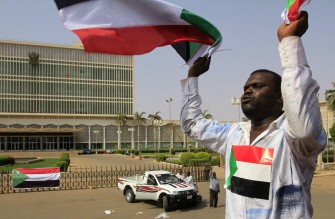JUBA, July 9, 2011 (AFP) - Celebrations erupted across Juba as jubilant crowds marked South Sudan's long-awaited day of freedom on Saturday, when the chronically underdeveloped region became the world's newest nation.
"Today we shall raise the flag of South Sudan to join the nations of the world," said Pagan Amum, the secretary general of the ruling Sudan People's Liberation Movement as tens of thousands gathered for the official proclamation of the south's independence.
Sudanese President Omar al-Bashir -- who led northern forces for the last 16 years of the devastating 1983-2005 civil war in which the south staked its claim for independence -- flew into Juba for the ceremony as guest of honour.
From early morning, revellers gathered at the venue, singing songs and carrying flags, amid tight security.

"South Sudan oyee! Free South Sudan!" Amum chanted from the podium, as the expectant crowd awaited the start.
It was the largest international gathering ever seen in the war-damaged former garrison town on the White Nile that lacks even basic infrastructure, and army generals were asked to vacate their seats to make space for foreign dignitaries.
The historic ceremony was due to be attended by 30 African leaders and senior Western officials.
"This is the special day," said Joseph Legge. "We cannot wait to see the flags swap -- north down and south up."
South Sudan's independence comes exactly six months after a referendum saw southerners vote almost unanimously to split with their former civil war enemies in the north.
For decades, until a peace agreement was signed in 2005, southern rebels fought successive wars with the north, leaving the region in ruins, millions of people dead and a legacy of mutual mistrust.
The independence ceremony is being held at the mausoleum of the late rebel leader John Garang, who died just months after signing the peace accord that ended Africa's longest-running conflict and opened the door to nationhood.
"This is a historic day, a day of justice, a day I am so happy to see. Today we can move on with a new life and forget the suffering and the pain," said Archbishop Daniel Deng Bol, head of the Episcopal Church of Sudan.
Military parades, prayers and a performance of the new national anthem were due to take place from 0815 GMT, followed by the declaration of independence, the raising of the Republic of South Sudan's flag and the new country's first president, Salva Kiir, taking the oath of office.
Southern officials have said the guest of honour at the celebrations will be Bashir, who is wanted by the International Criminal Court on charges of crimes against humanity and genocide in Darfur.
There were Darfuris among those waiting expectantly at Garang's mausoleum.
"We are here to welcome our brothers in the south in independence, and give a message to Bashir, that this is what happens when you oppress a people," said Mohammed Jamous.
Around 200 supporters of Darfur rebel leader Abdelwahid Nur held a banner that read: "The new beginning," and "Together we must stop genocide in Darfur, Nuba Mountains."
The Nuba Mountains in South Kordofan state in the north have seen deadly clashes in the run-up to southern independence between northern troops and pro-southern militia.
French Foreign Minister Alain Juppe has already said he will try to avoid an encounter with Bashir at the independence ceremony.
But Khartoum was among the first countries to officially recognise the fledgling nation, which needs all the help it can get to overcome the vast challenges of building a stable and prosperous future.
For this, it must strike a cooperative relationship with Bashir, given the strong ties that continue to bind the two countries, and despite the strain on relations caused by the bloodshed in the Nuba Mountains.
Talks in Addis Ababa aimed at resolving issues still outstanding between north and south, such as the future status of the disputed border district of Abyei, how to manage the country's oil sector and the fate of southerners in the north and northerners in the south, have so far failed to bear fruit.
UN chief Ban Ki-moon, another prominent guest at the ceremony, on Friday praised the "political courage" of the Sudanese government in accepting southern independence.
"I know secession is painful, emotionally and financially," Ban said after meeting Foreign Minister Ali Karti in Khartoum before flying to Juba for the celebrations.
"While the people of north and south Sudan will soon live in different countries, their future will be closely linked."







)
















